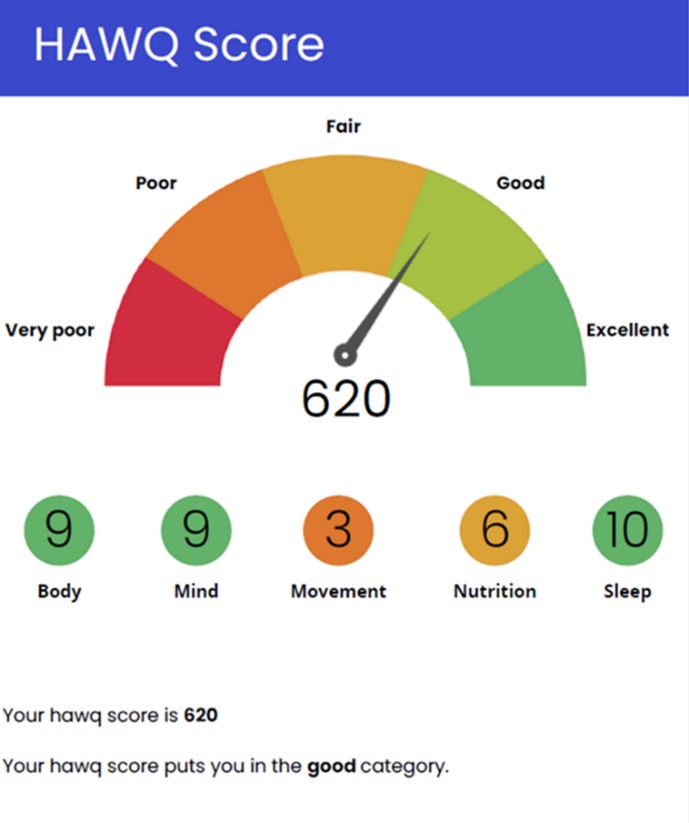As we stand on the cusp of a new era in corporate wellbeing, it’s crucial to gain insight into the trends that will shape the landscape over the next year. We speak to the wellbeing brand HAWQ Co-Founders Livvy Probert and Robbie Johnston, who share their perspectives on these trends and the potential impact on the betterment of the nation’s workforce.
Trend 1: Longevity
The modern workforce is evolving and so are our perspectives on employee health. In the coming year, we expect the paradigm shift in the way we approach employee wellbeing to continue its expansion into ‘Longevity’. This recognises that employee wellbeing extends far beyond the traditional emphasis on physical fitness. No longer is a simple discounted gym membership enough of an incentive to get employees active. Instead, employers will need to do more to embrace a holistic approach to health, encompassing the mind, body, emotional and even financial wellbeing of employees.
As organisations increasingly understand the importance of nurturing the whole employee, we’ll continue to witness a shift towards programs and initiatives that cater to mental health, emotional resilience, cognitive function, and work-life balance. Holistic health will be creating environments where employees can thrive, both personally and professionally.
Wellbeing is not just about exercise or diet; it’s about nurturing the body and mind. Our work with Creditspring this year is proof of this, with employees reporting an improved bond between their colleagues, fostering a strong human support network, a key principle when assessing overall health and longevity.
Trend 2: Wellbeing-Economy Approach
In light of the recent surge in sick days in the UK, it’s going to be crucial to apply an approach that can address this concerning issue. One such trend with significant implications for corporate wellbeing is the rise of a wellbeing economy, a movement gaining momentum globally. What this means is putting people’s quality of life and wellbeing at the heart of economic recovery following Covid-19.
The World Health Organisation (WHO), which launched an initiative last year to place wellbeing at the heart of economic recovery, plays a pivotal role in influencing and inspiring governments and businesses around the world to invest in recovery and growth practices that will improve personal, mental, economic, social, and environmental well-being.
As a result, we’re seeing a rise in government-backed initiatives aimed at boosting employee health and wellbeing, as governments around the world are recognising the direct link between employee wellbeing and economic productivity. The UK’s recent rise in sick days serves as a reminder of the urgent need for such initiatives.
Over the next year, we anticipate more government support for wellbeing programs and healthcare accessibility. Organisations will increasingly partner with metric-driven health and wellbeing partners, to provide employees with access to quality and meaningful health, fitness, and wellbeing services. We’re excited about what this means for the corporate wellbeing space and the impact it will potentially have on our industry.
Trend 3: Engagement and ROI of Schemes:
The most pressing question for organisations investing in wellbeing programs has always been ‘What’s the return on investment?’. In the coming year, we’ll see a growing focus on measuring and maximising the ROI of corporate wellbeing schemes.
Being able to show the tangible benefits and true return on investment through aggregated and anonymised data offers a breakdown of a company’s health and wellbeing efforts for employees. Having access to this sort of data will ultimately enable organisations to tailor decisions on how best to improve the health and wellbeing of the team for the long term.
- A Case Study:
For instance, our partnership with Creditspring has demonstrated the impact of tailored corporate wellbeing programs like HAWQ on ROI, as there has been a direct relationship between spend on wellbeing and improved employee health. Results have been remarkable, as employees at Creditspring had:
- +10% improved sleep quality
- -5.1cm average loss of waist circumference.
- +16% increase in cardiovascular fitness (data findings from VO2 Max testing)
- 1 hour per day less time sedentary
- 6 on average less beats per minute resting heart rate
- 5mm decrease on average of HG systolic blood pressure.
Overall, Creditspring’s employees enjoyed a collective ‘HAWQ score’ of over 87 points (see appendix for more info). These results prove that the bespoke programming has supported them across the most significant areas of health & wellbeing (Body, Movement, Nutrition, Sleep and Mind).
What is instrumental, however, is the effect of these results on the morale within the team, as initial findings show Creditspring have found the process as a beneficial team activity, seeing improved bonds between colleagues, and more positive and supportive discussions. Neil Kadagathur, Creditspring CEO, says “Working with the HAWQ team had an immediate impact, the whole team appreciates knowing we’re taking care of them and their wellbeing.”
The Future Outlook:
In the next year, organisations will intensify efforts to measure the ROI of corporate wellbeing schemes, this will involve leveraging data analytics to track the impact of wellbeing programs on key performance indicators, such as reduced absenteeism, increased productivity, and improved employee retention.
As we move forward, the importance of a holistic approach to employee wellbeing cannot be overstated. Embracing ‘trends’ like Longevity and Holistic Health, collaborating with government initiatives and optimising the ROI of schemes will be key drivers of success.
Conclusion:
The future of corporate wellbeing is bright and transformative. At HAWQ we work with businesses to help them commit to continuing this journey towards enhancing employee health and wellbeing on a personal level and as a community. Our data-driven approach and individualised coaching will play a pivotal role in achieving lasting positive change in organisations across the UK. We wish to build a future where employees thrive and businesses flourish, making wellbeing a cornerstone of success in the corporate world over the next year and beyond.









